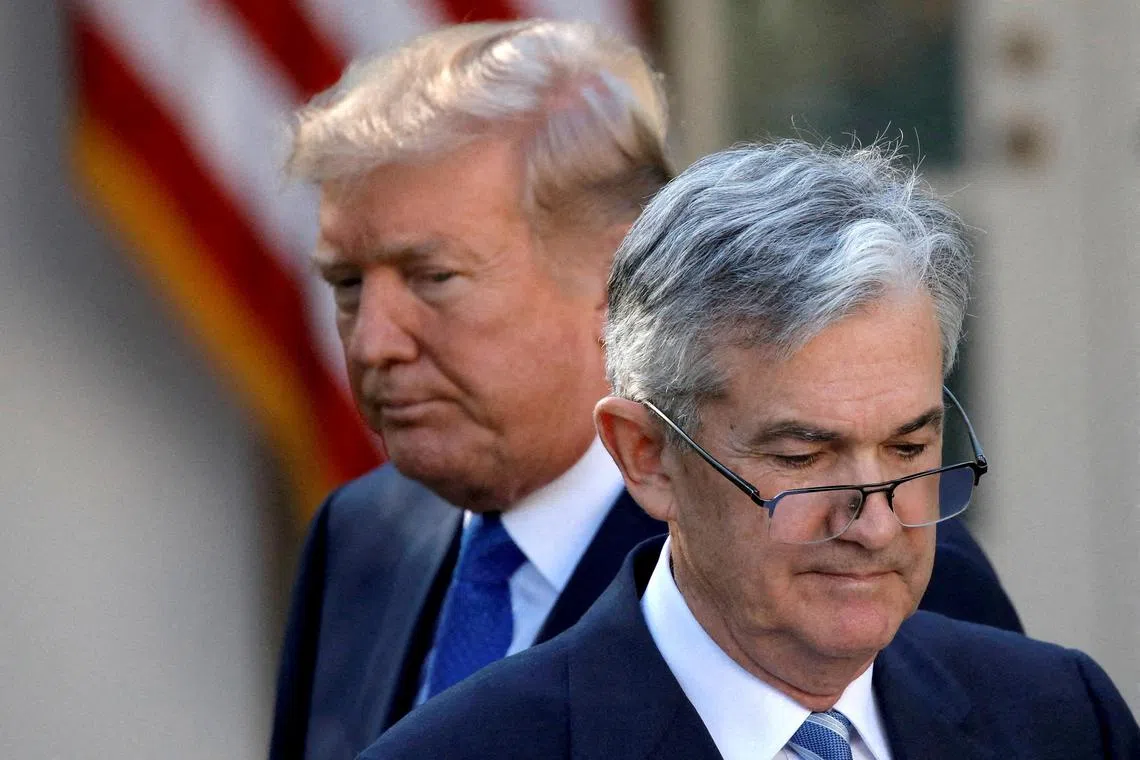ST Explains: What a Trump ouster of Fed chief Powell could mean for S’pore markets
Sign up now: Get ST's newsletters delivered to your inbox

A rate cut by the Fed can be expected to boost sentiment in the Singapore equities market.
PHOTO: LIANHE ZAOBAO
SINGAPORE - US President Donald Trump has reignited worries over the independence of the US Federal Reserve after he said on July 16 that he had floated the idea of firing its chief with Republican lawmakers.
Mr Trump, who later denied media reports that he was planning such a move
The US leader has also called for the Fed chairman’s resignation multiple times since becoming president.
His comments have heightened fears of political interference in US monetary policy, raising concerns that if Mr Powell is removed, his successor may face greater political pressure to cut interest rates despite legal protections shielding Fed governors from dismissal by the White House over interest rate decisions.
Still, the law does allow for removal “for cause”, and White House officials have recently accused the Fed of mismanaging public funds for the US$2.5 billion (S$3.2 billion) renovation of its Washington headquarters, a project they claim has overrun by hundreds of millions of dollars.
Why does the President want lower interest rates, and why doesn’t the Fed?
The US President wants lower rates because net interest payments on US government debt are currently consuming a significant and growing portion of total government spending, said Mr Vasu Menon, managing director of investment strategy at OCBC Bank.
The US government’s fiscal year-to-date deficit is reported to be at US$1.36 trillion, which is 14 per cent higher than the same period in 2024.
“There are concerns that this trend could continue and impact the ability of the US to fund other essential programmes and maintain its military supremacy. This is a key reason why Trump is pushing for lower rates,” he said.
Lower rates will also help to offset the negative effects of higher tariffs on the US economy.
“Lower interest rates are expected to support short-term economic growth by reducing borrowing costs for consumers and businesses,” said Dr Felix Brill, group chief investment officer at private banking group VP Bank.
Additionally, lower rates can weaken the US dollar, making exports more competitive, which is helpful in trade negotiations.
Despite pressure from the White House to cut rates, Mr Powell has so far been reluctant to do so.
Mr Suan Teck Kin, UOB’s head of research, said the Fed’s cautious stance is “unsurprising”.
He noted that the inflationary effects of Mr Trump’s tariffs remain uncertain, including whether their impact on US prices will be a one-off spike or more persistent.
In the light of this uncertainty, the Fed is adopting a patient, wait-and-see approach to better evaluate the situation before making any policy shifts.
What are the consequences of lowering interest rates at this point in time?
Cutting rates amid rising US tariffs could further fuel inflation, especially if the economy and consumer spending remain stronger than expected.
Rising inflation goes against one of the Fed’s key mandates, which is to keep prices in check and achieve maximum sustainable employment.
With inflation still above the 2 per cent target and the economy showing resilience, premature rate cuts could undermine Mr Powell’s credibility, particularly if inflation accelerates again due to tariffs, Dr Brill said.
Mr Suan added that with US inflation having accelerated in recent months, “a rate cut at this juncture may send a wrong signal to the markets that the Fed’s independence and ability to carry out its dual mandate is being compromised”.
What’s the longer-term impact on the market if the Fed is seen to be politically captured?
The Fed’s independence is critical to long-term confidence in the US economy, as it signals that the central bank can act decisively without political interference, Mr Menon said.
This trust reassures investors and consumers that the Fed will take necessary steps to maintain stability, and bolsters global confidence in the US dollar, Treasuries and other assets.
If that independence is compromised, it could erode trust in US markets, triggering wider repercussions across global financial systems, he added.
For example, if the markets believe that the Fed will cut interest rates because of political pressure, investors could demand higher yields from US Treasuries to compensate for the added risk. This could hurt the ability of the US government to raise funds by issuing Treasuries.
Over the longer term, Mr Suan added, an erosion of the Fed’s independence could also lead to the weakening of trust and confidence in the US dollar, and the US financial system as a whole.
How will this affect Singapore?
Nevertheless, a rate cut by the Fed can be expected to boost sentiment in the Singapore equities market, said Mr James Ooi, market strategist at Tiger Brokers Singapore.
“Lower US interest rates tend to support Singapore equities by reducing borrowing costs, increasing demand for yield-generating assets such as real estate investment trusts and banks, and improving valuations through lower discount rates,” said Mr Ooi.
Mr Thomas Rupf, chief investment officer at VP Bank in Asia, added that the Singapore dollar should stay strong if US rates are cut, as investors continue to view it as a safe and stable option in Asia.

US President Donald Trump has repeatedly criticised Fed chief Jerome Powell for being “too late” in cutting interest rates.
PHOTO: REUTERS
However, while the Singdollar’s strength helps to contain imported inflation, it also makes exports less competitive and tightens financial conditions at home, Mr Rupf said.
“To offset this, Singapore may need to ease monetary policy further. Lower borrowing costs would support businesses and households while helping to alleviate some of the pressure caused by the strong currency,” he said.
“While MAS (Monetary Authority of Singapore) may choose to adjust the exchange rate settings or hold off for now to keep dry powder, the broader direction appears to be towards a more supportive monetary environment.
“Unless there is a clear pick-up in global growth or a significant shift in the strength of the Singapore dollar, interest rates here are likely to drift lower in the coming months to keep local financial conditions balanced.”
MAS is expected to review its policy stance later in July.
Mr Menon said that if rates are cut and US markets rally, it should augur well for local investment markets.
However, any sell-off in the US and global markets as a result of the Fed’s independence being seen as compromised will hurt the Singapore equity and bond markets, he warned.
“Singapore is a small and open economy with strong linkages to the global economy and capital markets, so what happens overseas, especially in the US which is a major trading partner, will have an impact on the local economy and investment markets,” he said.



